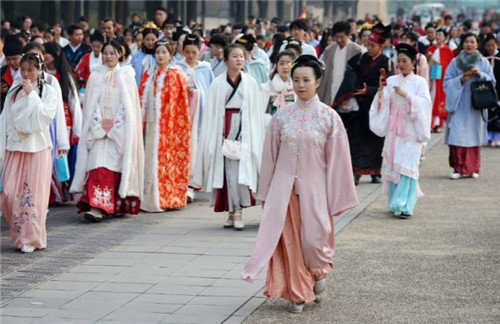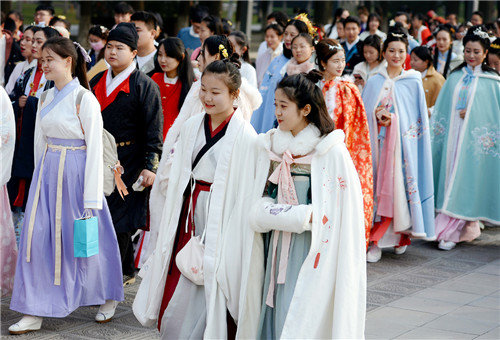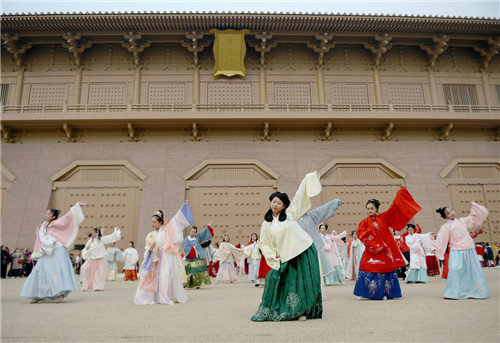Hanfu connects people with traditional cultural roots

As more and more young people are wearing hanfu, the traditional clothing of the Han ethnic group, industries of hanfu manufacture and traditional Chinese culture thrive.
Ran Dan is a huge fan of hanfu in Beijing. "I started to know hanfu in 2011 when I accidentally saw some hanfu photos and was completely stunned by its beauty. Soon I had my first set of hanfu. At present, I have more than 50 sets of hanfu, and over 80 single pieces," Ran shared her fascination with hanfu.
Unlike other people who wear traditional ethnic clothing on special occasions, however, Ran wears hanfu on a daily basis.
"Many people think hanfu is inconvenient in daily life. In fact, there are many styles of hanfu. Wide and long sleeved hanfu may not be convenient, but narrow sleeved ones will not affect work at all," she said.
So far, the hanfu market is estimated to have more than two million consumers across China, and the total market value of the sector has reached around 1.09 billion yuan (US $ 154 million).

With its increased popularity, stores renting hanfu rose rapidly. From April to August this year, the number of hanfu rental stores in Beijing increased from three to more than 20, media reported. In addition, online sales of hanfu surged by 146 percent year-on-year and sales of traditional Chinese style creative jewelry increased by 94 percent year-on-year, according to an e-commerce platform.
"Students are the largest group of customers of hanfu across China, but we also target adults as our customers," said Daoding, who runs an online hanfu store which has cooperated with more than 20 brick-and-mortar stores and has 45,000 fans on media video app douyin.
Female customers dominate the hanfu market, said Daoding, adding that the male to female ratio of its customers was 1:5.
Overseas students and ethnic Chinese are also hanfu lovers. "Overseas students have a deep national and cultural identity with the motherland as they live in a foreign country," Daoding explained.

In addition, many people had a deeper understanding of traditional culture through hanfu, said Daoding.
When promoting hanfu, traditional culture promotion and inheritance are also promoted. This is also what many hanfu cultural associations have been doing.
Hanfu Beijing, a hanfu association in Beijing, is among them. Established in 2009, the association is the largest and longest-existing hanfu cultural association in Beijing, with 600 registered members.
Associations like Hanfu Beijing have organized a variety of activities, including traditional festival activities, publicity performances, etiquette activities and internal training activities.
"Hanfu is a part of traditional culture that cannot be ignored. The return of hanfu that we advocate is not about calling on people to wear hanfu and live the life of the ancients. We expect more people to explore the cultural significance behind hanfu,” Ran explained.
"Hanfu is not just a piece of clothing, but an expression of the national spirit and cultural heritage. We believed hanfu is more than a decoration for external beauty; more importantly, it enriches our minds," said a person in charge at Hanfu Beijing.










